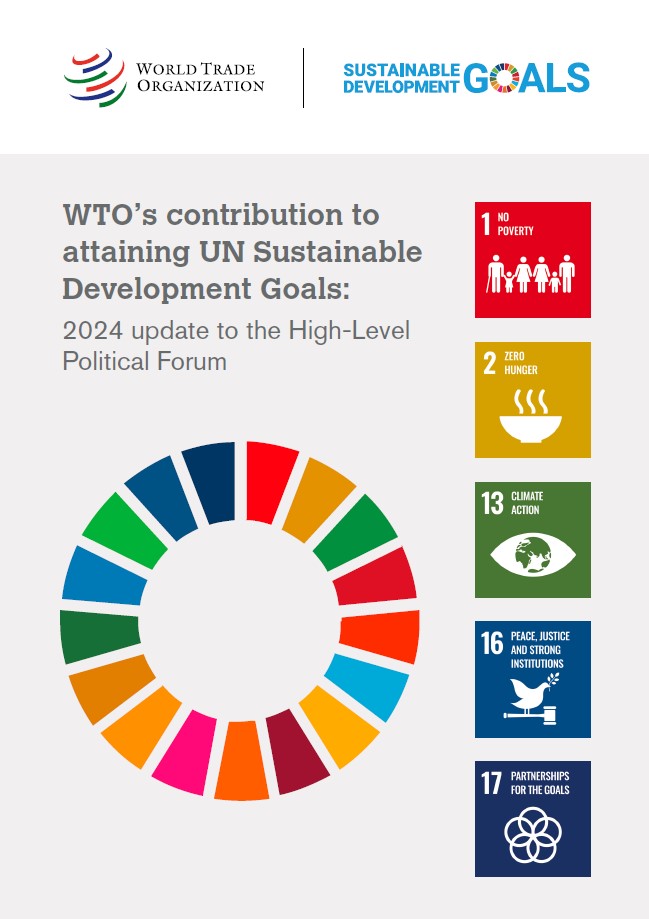sustainable development goals (sdgs)
The WTO's contribution to achieving the SDGs
The WTO is playing an important role in the achievement of the UN's Agenda 2030 for Sustainable Development and collaborates closely with the UN's Department for Economic and Social Affairs in monitoring progress in attaining the Sustainable Development Goals (SDGs). The WTO reports annually to the UN's High-level Political Forum (HLPF) on WTO efforts to achieve trade-specific targets in the SDGs. The HLPF is the UN's main means of reviewing the 2030 Agenda for Sustainable Development and allows all UN members and specialised agencies to meet annually to evaluate progress on achieving the SDGs.
HLPF 2024: “Reinforcing the 2030 Agenda and eradicating poverty in times of multiple crisis: the effective delivery of sustainable, resilient and innovative solutions”
The 2024 High-Level Political Forum (HLPF) took place from 8 to 17 July under the auspices of the UN's Department for Economic and Social Affairs. The 2024 programme can be found here.
The Forum considered how to enhance cooperation and advance the 2030 Agenda despite the challenges posed by multiple global crises. It reviewed progress toward the attainment of the SDGs, with a specific focus on the following five:
- Goal 1: No Poverty
- Goal 2: Zero Hunger
- Goal 13: Climate Action
- Goal 16: Peace, Justice and Strong Institutions
- Goal 17: Partnerships for the Goals
The WTO report to the 2024 HLPF draws attention to the critical role of trade in eradicating poverty, enhancing food security, supporting climate action and building strong institutions for peace.
On SDG 1, the report emphasizes that international trade has significantly contributed to reducing poverty and promoting economic development globally by increasing income levels and productivity convergence. However, it warns that geopolitical fragmentation threatens to undermine these gains by reducing trade efficiency, knowledge diffusion and access to technologies, with developing economies and least-developed countries (LDCs) particularly at risk. The report advocates for inclusive international cooperation to ensure that the benefits of trade are shared more broadly within economies.
On SDG 2, the report describes how progress toward the attainment of this goal has met with significant challenges, with global undernourishment affecting 9 per cent of the population in 2022 and projections indicating nearly 600 million people may face hunger by 2030. Nevertheless, agricultural trade has increased and is playing a crucial role in global resilience, and the WTO is contributing to SDG 2 through various initiatives, including the elimination of agricultural export subsidies and active monitoring of trade-related issues affecting food security.
On SDG 13, the report underscores the crucial role of trade in aiding climate action by spreading green technologies and sustainable practices. It emphasizes the importance of coordinated trade policies to address environmental challenges caused by policy fragmentation, as well as the potential role of government procurement to promote green innovation and sustainable goods and services. The report demonstrates that the green transition presents development opportunities for historically marginalized economies, such as through trade in renewable energy and critical raw materials.
On SDG 16, the report examines the role of trade and the WTO in promoting peace, justice and strong institutions. It notes that, while conflict can disrupt trade, trade can foster peace by creating economic cooperation among economies — a fundamental WTO principle. It highlights how the WTO accession process improves governance in aspiring member economies through legal reforms and increased transparency, and describes the WTO's Trade for Peace Programme as an initiative exploring the contribution of trade to peace-building in fragile and conflict-affected states. The report also emphasizes the role of WTO trade policy reviews in promoting policy coherence and strengthening institutions by improving information sharing and stakeholder participation.
On SDG 17, the report emphasizes the progress made at the 13th WTO Ministerial Conference in early 2024 towards reinforcing global partnerships for sustainable development through trade. The Abu Dhabi Ministerial Declaration recalls the objectives of the Marrakesh Agreement and recognizes the vital role of the multilateral trading system in achieving the UN 2030 Agenda and the SDGs, as according to the WTO's mandate. The Declaration reaffirms commitment to a rules-based trading system, aligning with SDG target 17.10. Key outcomes of the Conference included measures to support developing economies and LDCs, progress on environmental initiatives, steps towards dispute settlement reform and decisions on e-commerce. These actions collectively strengthen the WTO's role in fostering global partnerships and creating a more inclusive, sustainable trading system.
For more details, the full WTO report can be accessed here.
Previous WTO reports to the HLPF
Background
UN members adopted, in 2016, the 2030 Agenda for Sustainable Development, which contains the 17 Sustainable Development Goals (SDGs). These SDGs reflect the understanding that development is closely linked with economic growth, social well-being and environmental sustainability and that the SDGs offer the most effective and flexible way to address conflict, human rights issues, poverty and inequality as well as climate change and environmental degradation around the world.
The UN recognises that trade is an engine for inclusive economic growth and poverty reduction that contributes to sustainable development. International trade accounts for over 50 per cent of low-income countries' GDP and is an important source of income for both the private and public sector in developing countries.
Trade enhances a country’s income-generating capacity, an essential prerequisite for achieving sustainable development.
Share
Problems viewing this page? If so, please contact [email protected] giving details of the operating system and web browser you are using.
